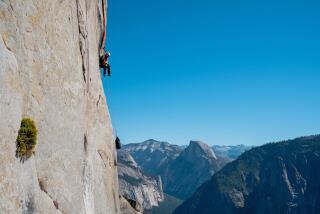Spirituality sustains those left ‘Stranded’
“Stranded: I’ve Come From a Plane That Crashed on the Mountains” is an exceptional film, at once disturbing and elevating, deliberate yet powerful. It takes a story that we all think we know, one of the 20th century’s most familiar tales of resilience and survival, and demonstrates that we haven’t really known it at all.
“Stranded’s” narrative is familiar because, under the title “Alive,” it was both an internationally bestselling book and a Hollywood movie starring Ethan Hawke. Who doesn’t have at least a vague knowledge of the story of the Uruguayan airliner that slammed into the Andes in 1972, and of the 16 young men who survived an unheard-of 72 days in part because they did the unthinkable and ate the flesh of those who died?
But it is only now, some 35 years after the fact, that all the people who made it out alive agreed to talk on camera with breathtaking candor and startling detail about the nature of their experience, about what they went through and what their thoughts about it are today.
These stories do not shortchange the horror of the situation but, under the direction of Gonzalo Arijon, “Stranded” understands that out of disaster can come the purity of transcendence. Against all expectation, the survivors’ experience turns out to have been a surprisingly spiritual one, a story of near-reincarnation and intimate religious communion.
As “Alive” author Piers Paul Read noted in the book’s acknowledgments, some survivors have always felt that “the faith and friendship which inspired them . . . do not emerge in these pages. . . . Perhaps it would be beyond the skill of any writer to express their own appreciation of what they lived through.” Now, with this film, that appreciation has taken tangible form.
One reason these men felt safe finally unburdening themselves was that veteran documentarian Arijon, born in Montevideo but a resident of Paris for nearly 30 years, was in fact a boyhood friend of many of the young men who got on that plane on Friday, Oct. 13, 1972.
And what persuasive, articulate talkers the “Stranded” survivors turn out to be. We hang on their every word as these voices combine to remember every moment with a vividness and an immediacy that is overwhelming.
In addition to doing the interviews, director Arijon had other ways of making his narrative especially effective, starting with utilizing the film’s delicate, otherworldly score by composer Florencia Di Concilio-Perrin to add a disturbing air to the proceedings.
Since no film exists of the “Stranded” experience (with the exception of newsreel footage of the rescue), Arijon made the risky decision to use re-creations to help tell the story.
Though this technique can be heavy-handed, as shot by cinematographer Cesar Charlone (Oscar nominated for “City of God” and, unbelievably, nearly a passenger on that plane) the scenes are quietly effective.
Quiet is the operative word here: Because no one in the re-creations talks on camera, the sequences come off as dreamlike and haunting, which is as they should be.
The re-creations are also an effective companion piece to “Stranded’s” contemporary footage, which follows the adult survivors as they take a summertime trip back to the Valley of Tears in the Andes, the original crash site, and try and convey to their children the nature of the experience.
These men were just 19 years old themselves in 1972, members of a rugby team associated with a Catholic school, headed for a game in Santiago, Chile, and what they thought would be a weekend “full of adventure and excitement”
The crash itself killed 12 of the 45 passengers, and numerous others gradually died from a combination of injuries and starvation. When those still alive heard on their still-functioning radio that the search for them had been abandoned, they came around with tremendous reluctance to the notion of what they had to do to survive.
“Stranded” emphasizes that what kept this deeply Catholic group together was its “strong sense of unity and solidarity” and that the decision to eat human flesh was done in the respectful spirit of the most serious religious ritual. Instead of feeling exploitative, the scenes in which the decision and its consequences are discussed are the most deeply moving of the film.
Also stirring are the descriptions of how the group was finally rescued, how two of their number walked for 10 days before reaching help, going so far (44 miles over peaks that reached 13,000 feet) that the rescue helicopter pilots they guided back to their friends thought they couldn’t possibly have covered so great a distance.
Roberto Cannessa, one of the two who went for help, was at “Stranded’s” Sundance premiere, and it’s no exaggeration to say that what he experienced has turned him into a figure of enormous charisma and grace.
Asked at the screening to reflect on it all, he replied quietly, “Make plans for 100 years, but you must be ready to die at any moment.”
Words to live by, and a film impossible to forget.
--
--
‘Stranded: I’ve Come From a Plane That Crashed on the Mountains’
MPAA rating: Not rated
Running time: 2 hours, 6 minutes
Playing: At the Nuart Theatre, 11272 Santa Monica Blvd., West Los Angeles, (310) 281-8223
More to Read
Sign up for our Book Club newsletter
Get the latest news, events and more from the Los Angeles Times Book Club, and help us get L.A. reading and talking.
You may occasionally receive promotional content from the Los Angeles Times.








